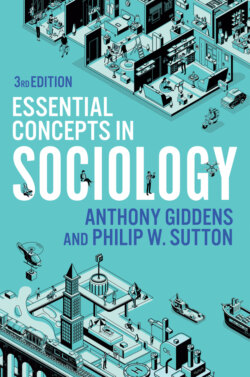Читать книгу Essential Concepts in Sociology - Anthony Giddens - Страница 85
Origins of the Concept
ОглавлениеAlthough questions of human free will have been part of philosophical debates for centuries, in sociology this issue translated into the ‘problem’ of agency and structure. The problem itself is a direct result of the early sociologists’ insistence that there were indeed such things as society and social forces limiting individual choice and freedom. Herbert Spencer and August Comte saw social structures as groups, collectivities and aggregates of individuals, but it was Durkheim’s idea of social facts and of society as an entity in its own right that laid out the subject matter of the new discipline. The type of sociology which emerged focused on how individuals are moulded and shaped by social structures that are, to all intents and purposes, external to themselves and beyond their control. In twentieth-century functionalism, Talcott Parsons devised a theory of action which took social structures to be less ‘thing-like’ and closer to patterns of normative expectations and guidelines governing acceptable behaviour.
By the 1960s, the pendulum had swung against structure-led theories. Dennis Wrong (1961) and others argued that structuralist ideas left too little room for the creative actions of individuals, and many sociologists turned to more agencyfocused perspectives, such as symbolic interactionism, phenomenology and ethnomethodology. This shift towards the actor’s perspective was part of an emerging theoretical pluralism that students of sociology now experience as the normal state of affairs. However, since the 1980s there have been attempts to integrate structure and agency theoretically, such as the work of Archer (2003), Elias ([1939] 2000), Giddens (1984) and Bourdieu (1986).
